Cases of metabolic dysfunction-associated fatty liver disease have increased since before the COVID pandemic with late-night meals pre-pandemic and increased alcohol intake mid-pandemic as predictors
Liver disease negatively impacted by lifestyle changes during the first year of the pandemic, according to a new study in the journal Liver International.
The retrospective study used health checkup data of 973 participants between 2018 and 2020 from MedCity21, an advanced medical center for preventive medicine established by Osaka City University Hospital in 2014, and found that new diagnoses of metabolic dysfunction-associated fatty liver disease (MAFLD) rose from 22 before the COVID pandemic to 44 during the pandemic.
“Before the pandemic, we found routine late-night meals, or dinner 2 hours before bedtime, as an independent lifestyle predictor of developing MAFLD,” states Hideki Fujii, first author of the study, “however, analysis showed higher daily alcohol intake as an independent predictor of the disease during the pandemic.”
Pre-pandemic
Researchers analyzed the lifestyle habits of the 22 patients who developed MAFLD between July 2018 and December 2019, which included alcohol intake, exercise, sleep duration, meals per day, and late-night meals. Through a univariate and multivariate analysis of the data to control for potential risk factors like age, sex, etc., they found only the proportion of late-night meals as significantly higher, marking this as an independent predictor of developing MAFLD.
During pandemic
Between December 2019 and December 2020, in the additional 44 patients who developed MAFLD, researchers found a jump in alcohol intake mainly among patients less than 60 years of age. “This represents a major proportion of the working-age population,” says Dr. Fujii, “suggesting a need to more closely monitor and address this life-style change as the pandemic continues.” Also, the proportion of smokers and those who ate 2 meals a day instead of 3 were higher in those who developed MAFLD during the pandemic.
“Our data is drawn from individuals who, after undergoing abdominal ultrasonography in 2018, returned for routine follow-ups until 2020,” explains Dr. Fujii. While the research team is aware that this suggests most participants were healthy enough to engage in work and were sufficiently health conscious to voluntarily undergo health checkups, “we were curious about the impact COVID-19, and its associated “new normal” lifestyles, had on incidences of MAFLD,” continues Dr. Fujii – something that has remained until now, unknown.
As the pandemic continues into 2022, these results are ever more relevant for patient lifestyle counseling to prevent the increasing number of individuals with MAFLD.
###
We are Osaka City University - the oldest research university in Osaka. With 9 undergraduate faculties and 11 graduate schools all dedicated to making urban life better, energy cleaner, and people healthier and happier, we have won numerous awards and have produced 2 Nobel laureates. For more information, please visit our website at https://www.upc-osaka.ac.jp/new-univ/en-research/



